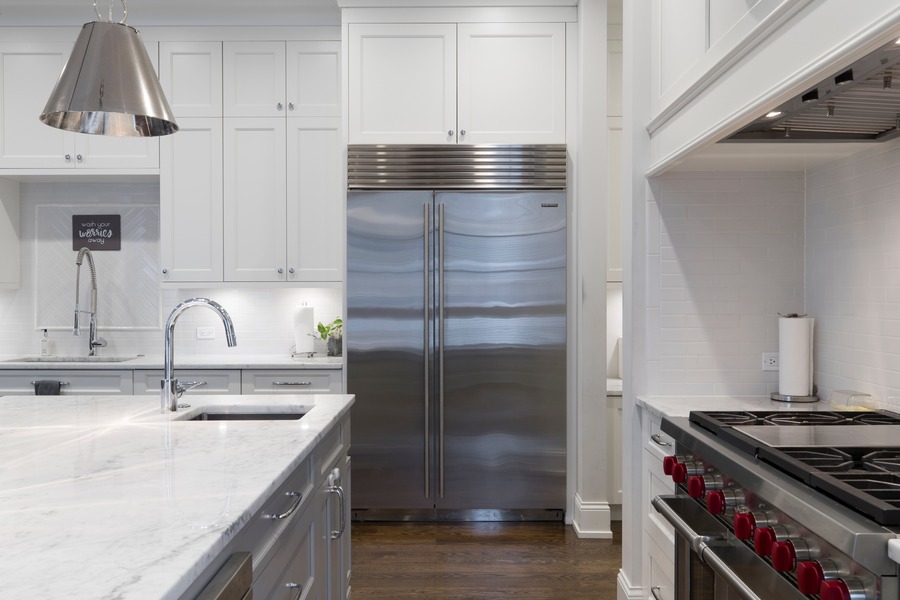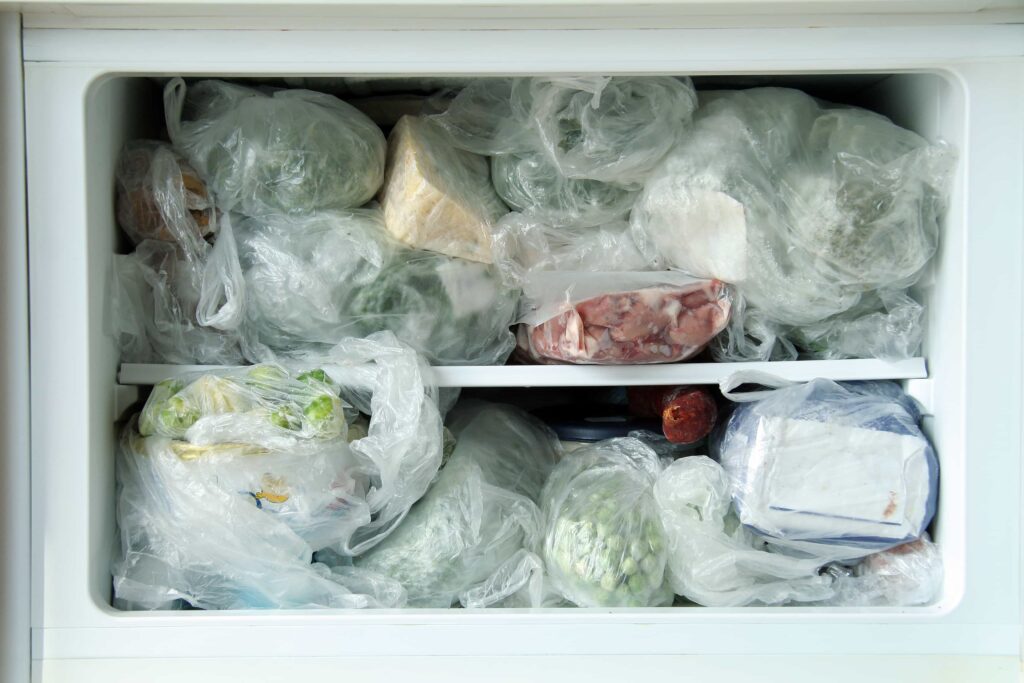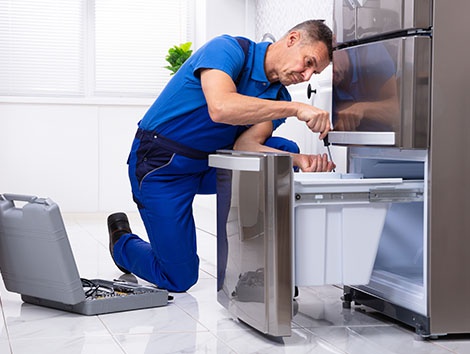Is your LG refrigerator-freezer giving you trouble? Is the lettuce in your fridge frozen solid? The ice cream is melting or there are odd noises. Are you looking for a solution by identifying the issue on your own? Here are some common refrigerator components that may be at fault for your LG appliance, whether it’s related to temperature, noise, or the water or ice dispenser.


The Most Common Problems With an LG Fridge in Canada
Temperature Problems
Overview: Maintaining the correct temperature in the fridge and freezer is crucial for food preservation. Temperature control problems can lead to food spoilage or freezing.
Possible Causes
- Temperature Settings: Incorrect temperature settings may require adjustment.
- Temperature Control Components: Issues with the temperature control thermostat, condenser coils, condenser or evaporator fan motor, start relay, start capacitor, thermistor, temperature control board, or main control board can affect temperature regulation.
- Linear Compressor: The linear compressor, a crucial component in LG fridges, can also be a source of temperature-related problems if it malfunctions.
LG Fridge Noise Problems
Overview: Unusual or loud noises coming from the fridge can be disruptive and indicate potential issues with various components.
Possible Causes
- Fan Blades: Rattling, grinding, or squealing noises may be caused by damaged or obstructed fan blades.
- Fan Motors: Evaporator or condenser fan motor issues can lead to noisy operation.
- Compressor: Bangs, thumps, or whistles often indicate a problem with the compressor, which is a vital part of the cooling system.
- Water Inlet Valve: Noises related to water flow can be attributed to a faulty water inlet valve.
LG Freezer Problems
Overview: Freezer problems can include temperature issues and noise disturbances. However, if the unit isn’t defrosting correctly, it could lead to additional concerns.
Possible Causes
- Defrost Control Components: Defrosting problems can be attributed to the defrost control board or thermostat, sensor, fuse, defrost timer, heater assembly, or main control board.
- Temperature-Related Issues: A faulty ice maker could be linked to freezer temperature, water inlet valve, filter, water supply pressure, assembly, icemaker module, door or icemaker switches, ice level control board, icemaker mold thermostat, and other temperature-sensitive components.


Ice Dispenser Problems
Overview: Issues with the ice dispenser, which is connected to the water dispenser and icemaker, can disrupt ice dispensing and impact overall functionality.
Possible Causes
- Dispenser Control Components: Problems with the dispenser control board, switch, auger motor, dispenser actuator, dispenser door motor or solenoid, ice bucket auger, or ice crusher blades can lead to ice dispenser issues.
Not Running Properly
Overview: When a fridge is not running properly, it may not cool or freeze as it should, leading to issues with food preservation and efficiency.
Possible Causes
- Compressor Issues: Problems with the compressor, such as malfunction or failure, can result in the refrigerator not running properly.
- Electrical Problems: Wiring issues, faulty start relay, or start capacitor can hinder the fridge’s operation.
- Thermistor Malfunction: A malfunctioning thermistor can affect temperature regulation and cause the fridge to run improperly.
Not Sealing Properly
Overview: A faulty door seal can lead to warm air entering the fridge, causing temperature fluctuations and potential food spoilage.
Possible Causes
- Worn or Damaged Door Gasket: The rubber door gasket that seals the fridge door may become worn, damaged, or loose, allowing warm air to infiltrate.
- Door Misalignment: If the fridge door is not properly aligned, it may not seal tightly, leading to sealing problems.
Not Freezing Food
Overview: When the freezer fails to freeze food adequately, it can result in thawing and food spoilage.
Possible Causes
- Refrigerant Leak: A refrigerant leak can prevent the freezer from reaching and maintaining the required freezing temperature.
- Defrost Control Issues: Problems with defrost control components, such as the defrost timer, thermostat, or heater assembly, can lead to inadequate freezing.
- Airflow Obstruction: Blockages in the air vents or excessive ice buildup in the freezer can disrupt airflow and hinder freezing.
Fridge Not Cooling
Overview: A refrigerator not cooling properly can lead to food spoilage.
Possible Causes
- Refrigerant Leak: A refrigerant leak can prevent the fridge from cooling efficiently.
- Faulty Compressor: If the compressor is not working correctly, the fridge won’t cool as it should.
- Blocked Air Vents: Blocked air vents due to food or ice can restrict cold air circulation.
Freezer Defrosting Issues
Overview: A freezer that doesn’t defrost properly can lead to ice buildup and poor performance.
Possible Causes
- Defrost Timer Failure: A malfunctioning defrost timer can cause the freezer to frost up.
- Defrost Heater Problems: If the defrost heater is faulty, it may not melt ice as it should.
- Thermistor Issues: Malfunctioning temperature sensors can affect the defrost cycle.
Interior Light Not Working
- Overview: A non-functioning interior light can make it challenging to locate items inside the fridge.
Possible Causes
- Burnt Out Bulb: The light bulb inside the fridge may need replacement.
- Faulty Door Switch: If the door switch is defective, it won’t activate the light when the door is opened.
How to Troubleshoot LG Fridge Problems
Temperature Issues
Overview: Temperature problems are among the most frequent LG refrigerator repairs, impacting food preservation. Ensure proper settings and cleanliness for optimal performance.
Troubleshooting and Repairs
- Temperature Settings: Check and adjust temperature settings if too high or low.
- Condenser Coils: Inspect and clean condenser coils to remove dust and debris.
- Fans: Ensure that condenser and evaporator fans are unobstructed and functioning quietly. Replace noisy or obstructed fans.
- Start Relay: Test continuity between start and run terminal sockets using a multimeter. Replace if no continuity or burnt smell is detected.
- Thermostat: Check for clicking when adjusting the thermostat. Test for continuity using a multimeter. Replace if no click or continuity is observed.
- Start Capacitor and Thermistor: Test both components with a multimeter. Replace if they are defective.
- Linear Compressor: Test with a multimeter for issues. If leaking or in need of replacement, seek a licensed technician’s help.
- Control Boards: Use a multimeter to check the temperature control board and main control board if other components are functioning properly. Replace if defective.


LG Fridge Noise Problems
Overview: Unwanted noises from the fridge are often attributed to fan blades and motors. Proper maintenance can address these issues.
Troubleshooting and Repairs
- Fan Blades: Check and replace noisy or damaged fan blades.
- Evaporator Fan Motor: Replace if noisy or louder when the fridge door is open.
- Condenser Fan Motor: Inspect and replace if necessary.
- Compressor: For compressor-related noises, only LG-authorized technicians should handle replacements.
Water Dispenser
Overview: Water dispenser problems can affect water flow and quality.
Troubleshooting and Repairs
- Water Tube: Check for ice blockages by disconnecting the water tube and blowing through it.
- Water Inlet Valve: Test for continuity and replace if defective. Ensure sufficient water pressure (20psi).
- Water Filter: Replace every six months to maintain proper water flow.
- Door Switch: Check for continuity and replace if needed.
- Dispenser Switches: Test each switch with a multimeter and replace if continuity is lacking. If all switches fail, consider the dispenser control board as the source.
LG Freezer Problems
- Overview: Freezer issues encompass defrost and icemaker malfunctions.
- Troubleshooting and Repairs:
- Defrost Control: Test the defrost control board, defrost heater, defrost thermostat, and defrost sensor with a fuse for continuity. Check the main control board if necessary.
Ice Dispenser
Overview: Ice dispenser problems are related to various components controlling ice dispensing.
Troubleshooting and Repairs
- Dispenser Switches: Test each switch for continuity and replace as needed.
- Dispenser Actuator: Replace if damaged.
- Auger Motor: Ensure it spins and test with a multimeter.
- Dispenser Door Motor: Verify if it receives power and replace if necessary.
- Dispenser Solenoid: Replace if defective.
- Dispenser Control Board: Test and replace if all other components are functioning properly.
Tips on How to Maintain LG Refrigerators
Maintaining your LG refrigerator properly is essential to ensure it operates efficiently, prevents problems, and prolongs its lifespan. Regular maintenance can save you money in the long run by reducing the need for costly repairs and preventing energy wastage. Here are some tips on how to maintain your LG fridge:
Clean the Condenser Coils
- Importance: Dirty condenser coils can cause your fridge to work harder and less efficiently.
- Maintenance: Vacuum or brush the condenser coils at least once or twice a year to remove dust and debris. Keep the area around the coils clean to allow for proper airflow.
Check and Adjust Temperature Settings
- Importance: Maintaining the correct temperature is crucial for food preservation and energy efficiency.
- Maintenance: Regularly check the temperature settings for both the fridge and freezer compartments. Adjust them as needed to ensure they stay within the recommended ranges.
Keep the Door Seals Clean and Intact
- Importance: Properly sealed fridge doors prevent warm air from entering the fridge, which can lead to temperature fluctuations.
- Maintenance: Clean the door seals regularly with a damp cloth to remove any dirt or spills. Ensure that the seals are intact and replace them if they are damaged or no longer sealing properly.
Regularly Replace Water Filters
- Importance: A clogged water filter can reduce water quality and impede water and ice dispenser performance.
- Maintenance: Follow the manufacturer’s recommendations for replacing water filters, typically every six months or as needed, to maintain water quality and dispenser efficiency.
Test and Clean the Ice Maker
- Importance: An improperly functioning ice maker can lead to ice-related issues and increased energy consumption.
- Maintenance: Regularly check the ice maker for proper function. Clean and sanitize the ice maker and ice storage bin as recommended by the manufacturer.
Maintain Proper Air Circulation
- Importance: Adequate airflow is essential for efficient cooling.
- Maintenance: Avoid blocking air vents with food items and ensure there’s space between the fridge and surrounding walls or cabinets for proper ventilation.
Inspect and Replace Faulty Components
- Importance: Identifying and replacing faulty components promptly can prevent more extensive problems.
- Maintenance: If you notice unusual noises, temperature fluctuations, or other issues, don’t hesitate to contact LG customer support or a professional technician for diagnosis and repairs.
Follow the User Manual
- Importance: The manufacturer’s recommendations for maintenance and care are invaluable.
- Maintenance: Refer to the user manual that came with your LG refrigerator for specific maintenance instructions and guidelines.
Frequently Asked Questions About LG Fridge Problems
Why is my LG fridge not cooling properly?
There are several things that can go wrong with cooling, including thermostat issues, compressor problems, dirty condenser coils, and temperature settings. You can fix this issue with regular maintenance and careful troubleshooting.
What should I do if my LG fridge is making strange noises?
Problems with fan motors, compressors, or other components may be indicated by unusual noises. You must locate the noise’s source before thinking about calling LG customer care or a qualified expert for an inspection and repairs.
How do I prevent my LG fridge from leaking water?
Condensation, a broken water entry valve, or a clogged defrost drain can all cause water leaks. Avoid leaks by performing routine drain cleaning and component inspections.
Why is my LG fridge’s ice maker not working correctly?
Problems with water inlet valves, temperature settings, or even clogged water filters may be the cause of ice maker issues. The issue can frequently be solved by performing maintenance and troubleshooting on these parts.
Additional Resources
- LG Canada Support: The official LG support page for Canada, which provides product manuals, troubleshooting instructions, and customer service contact details.
- LG Community Forums: An online forum where users of LG appliances can discuss common problems, offer solutions, and ask for guidance.
- LG authorized service center: Find an LG Authorized Service Center near you.
Always prioritize safety when working with appliances, and if in doubt, consult the manufacturer or a qualified technician at iCare Appliance for fridge repair services for LG fridge problems in Canada.
Experience top-notch appliance repair with Icare, your trusted LG certified servicers specializing in LG fridge repair and LG fridge compressor repair. Our expertise extends beyond LG, as we are Factory approved servicers for over 20 leading brands. Count on Icare for reliable and efficient repairs, ensuring your appliances run seamlessly.





